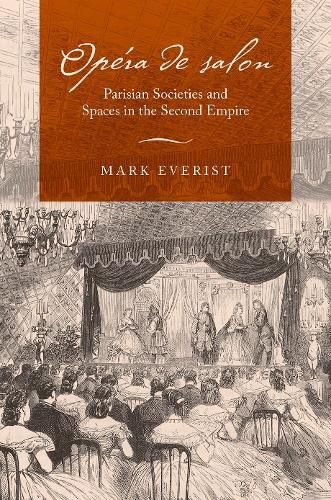Readings Newsletter
Become a Readings Member to make your shopping experience even easier.
Sign in or sign up for free!
You’re not far away from qualifying for FREE standard shipping within Australia
You’ve qualified for FREE standard shipping within Australia
The cart is loading…






Opera de salon emerged in the early 1850s out of a much longer tradition of theatre de societe: the cultivation of performing plays in aristocratic town houses and chateaux which continued into the Second Empire of the 1850s and 1860s, and beyond. It consisted of a one-act operette with between six and nine musical compositions separated by spoken dialogue that carried the action in the same way as opera-comique or operette itself. Opera de salon was separated from operette and related genres by its performance context: never shared with the regulated theatre, opera de salon was cultivated in domestic living spaces that were repurposed in ways that ranged from simply pushing back the furniture to building a fully-fledged theatre in one's own home. Opera de salon furthermore found its way into the concert culture hosted by Parisian piano manufacturers Herz, Erard, Pleyel, and others.
In Opera de salon: Parisian Societies and Salons in the Second Empire, author Mark Everist brings to light a genre and a set of cultural practices that have long been obscured. Approximately 130 operas de salon were composed and performed up to ca. 1875, and, as Everist demonstrates, they represent a significant generic trajectory in the history of nineteenth century music and theatre. Produced by major composers and librettists of the day, these works play into questions of gender, age, and urban topography in ways unlike other musical and theatrical genres of the day. Everist's focus is on the salon--the domestic, the private--but he also shows how opera de salon moves effortlessly between intimate familial space, the more public salon, to the public and largely commercial concert hall in ways that prompt reflection on the status of all these critical categories. Ultimately, Everist challenges the hermetic discipline of 'opera studies' by opening up massive repertories that are still unknown, and by developing critical practices that go beyond traditional categories of theatres, institutions, consumers, and creators.
$9.00 standard shipping within Australia
FREE standard shipping within Australia for orders over $100.00
Express & International shipping calculated at checkout
Opera de salon emerged in the early 1850s out of a much longer tradition of theatre de societe: the cultivation of performing plays in aristocratic town houses and chateaux which continued into the Second Empire of the 1850s and 1860s, and beyond. It consisted of a one-act operette with between six and nine musical compositions separated by spoken dialogue that carried the action in the same way as opera-comique or operette itself. Opera de salon was separated from operette and related genres by its performance context: never shared with the regulated theatre, opera de salon was cultivated in domestic living spaces that were repurposed in ways that ranged from simply pushing back the furniture to building a fully-fledged theatre in one's own home. Opera de salon furthermore found its way into the concert culture hosted by Parisian piano manufacturers Herz, Erard, Pleyel, and others.
In Opera de salon: Parisian Societies and Salons in the Second Empire, author Mark Everist brings to light a genre and a set of cultural practices that have long been obscured. Approximately 130 operas de salon were composed and performed up to ca. 1875, and, as Everist demonstrates, they represent a significant generic trajectory in the history of nineteenth century music and theatre. Produced by major composers and librettists of the day, these works play into questions of gender, age, and urban topography in ways unlike other musical and theatrical genres of the day. Everist's focus is on the salon--the domestic, the private--but he also shows how opera de salon moves effortlessly between intimate familial space, the more public salon, to the public and largely commercial concert hall in ways that prompt reflection on the status of all these critical categories. Ultimately, Everist challenges the hermetic discipline of 'opera studies' by opening up massive repertories that are still unknown, and by developing critical practices that go beyond traditional categories of theatres, institutions, consumers, and creators.